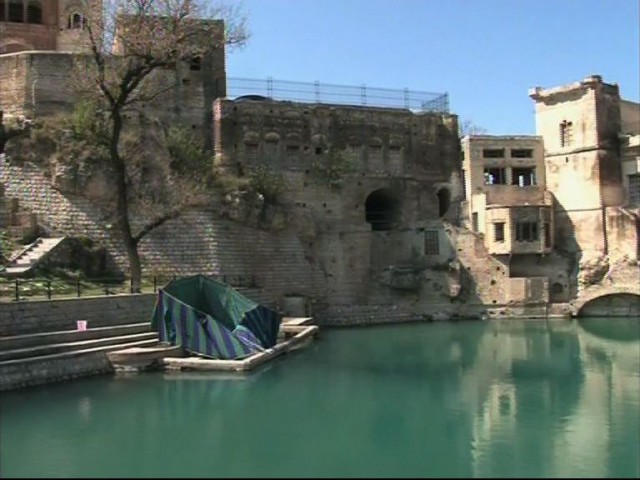News Desk |
The Supreme Court on Monday while hearing a case pertaining to the depleted Katas Raj pond in Chakwal barred cement factories from extracting groundwater. Wrapping up the Katas Raj case, the Supreme Court (SC) on Monday, 19th November, ordered DG Khan Cement Company Limited to deposit Rs100 million into the SC Dam Fund. Rs 80m has been charged as a cost for water used by the factory in production while remaining Rs20m is a penalty imposed by the court for misleading the court.
A two-judge bench headed by Chief Justice of Pakistan Justice Mian Saqib Nisar at the Supreme Court’s Lahore Registry heard the case pertaining to the depleted Katas Raj pond – a revered site for Hindus which is said to have depleted due to operations in the vicinity of several cement factories that have sucked out the underground water. As the hearing went underway, the chief justice remarked, “We are stopping the water supply of cement factories.
Wrapping up the Katas Raj case, the Supreme Court (SC) on Monday, 19th November, ordered DG Khan Cement Company Limited to deposit Rs100 million into the SC Dam Fund.
Factory owners say they collected rainwater but are not telling the truth and extracted groundwater through tube wells.” The bench also ordered that groundwater should not be extracted through tube wells from the Katas Raj pond. “Cement factories will not extract groundwater,” the bench directed. “Cement factories will have to pay a fine for the groundwater they have used till now,” the bench added.
Chief Justice of Pakistan (CJP) Mian Saqib Nisar issued the orders while hearing the suo moto case at Lahore Registry after media highlighted that the historic pond at Katas Raj temples in Chakwal, a revered site for Hindus, is said to have depleted due to operations in the vicinity of several cement factories that have sucked out the underground water. The case proceedings had been underway since December 2017.
Read more: Pakistan Dam Building: Lack of Leadership, Incompetence, Political Bickering and Mismanagement
In May this year, The Supreme Court of Pakistan ruled that Bestway Cement and DG Khan Cement should find an alternate source of water. The two companies also deposited Rs.2 billion as a security deposit and agreed to pay for the water they use from now on. The decision comes after a drawn-out probe into the Katas Raj temple drying up. Analysts have commented that while this decision will have a positive outcome, the factories seem to have escaped heavier penalties, in part due to the actions they took, especially in the case of Bestway cement.
Rs 80m has been charged as a cost for water used by the factory in production while remaining Rs20m is a penalty imposed by the court for misleading it in the case.
However, they have been given six months to find an alternate to Katas Raj pond that has nearly dried up due to heavy consumption in the area. The market was expecting a penalty for the water these companies have already consumed last year, said an analyst. According to UBL Funds’ research analyst Anjali Rawlani, the companies must establish their alternate source of water in a six-month period.
Read more: World Bank doesn’t want Pakistan to pursue the Kishanganga Dam dispute
Alternate sources
The installation of the pipeline is expected to cost around Rs2 to 2.5 billion while establishing a reservoir similar to Katas Raj pond size would cost around Rs100-150 million. The pond occupies an area of around 15,000 square feet with a maximum depth of 20 feet, a local publication reported. Until the new target of establishing a reservoir is achieved, the companies would be paying Punjab government for the water they use.
The case for Bestway cement has not been concluded yet, but the company has complied with all court orders and set up alternative arrangements for water which were committed to the court and put in place before the court assigned deadline. Bestway has invested more than PKR 1.5 billion in implementing an Air Cooled Condenser – this has allowed Bestway to reduce its industrial water consumption at its Chakwal and Kallar Kahar plants by 80% and 88% respectively. It is considered a pioneering use of a Waste Heat Recovery Power Plant in the cement industry in Pakistan. In doing so, Bestway has set a standard in environment conservation for the cement industry. This conversion makes Bestway’s two plants the most water-efficient and environmentally friendly plants in Pakistan. A positive outcome due to the Supreme Court’s actions.














